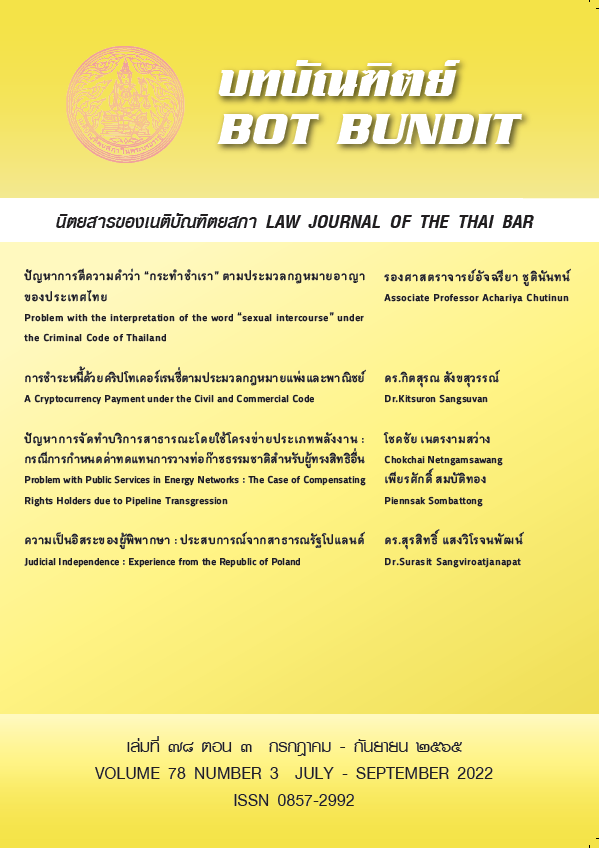ความเป็นอิสระของผู้พิพากษา : ประสบการณ์จากสาธารณรัฐโปแลนด์
Main Article Content
บทคัดย่อ
หลักอิสระตุลาการซึ่งเป็นส่วนหนึ่งของหลักนิติรัฐและเป็นหลักประกันการปฏิบัติหน้าที่ของผู้พิพากษาที่ได้รับการยอมรับในทุกระบบกฎหมาย หลักการดังกล่าวประกอบไปด้วย หลักความเป็นอิสระในการปฏิบัติหน้าที่และหลักความเป็นอิสระในทางส่วนตัวที่จะสร้างหลักประกันให้แก่ผู้พิพากษาว่าตนเองจะสามารถปฏิบัติหน้าที่ให้เป็นไปตามกฎหมายและจิตสำนึกของตน การมีแนวคิดในเรื่องของความคุ้มกันผู้พิพากษา ถือเป็นองค์ประกอบอีกส่วนหนึ่งที่จะมาเสริมความเป็นอิสระในการปฏิบัติหน้าที่ดังกล่าวซึ่งระบบกฎหมายของสาธารณรัฐโปแลนด์ได้สร้างหลักประกันที่กล่าวมาทั้งหมดนี้ไว้ในกฎหมายรัฐธรรมนูญและพระธรรมนูญศาลยุติธรรม
Article Details

อนุญาตภายใต้เงื่อนไข Creative Commons Attribution-NonCommercial-NoDerivatives 4.0 International License.
เอกสารอ้างอิง
ภาษาไทย
บรรเจิด สิงคะเนติ. (๒๕๖๔). หลักกฎหมายมหาชน หลักนิติธรรม/นิติรัฐ. (พิมพ์ครั้งที่ ๓). สำนักพิมพ์วิญญูชน.
พจนา สะอาดเอี่ยม. (๒๕๕๙). ความเป็นอิสระของตุลาการกรณีได้รับการแต่งตั้งโดยฝ่ายนิติบัญญัติ [วิทยานิพนธ์นิติศาสตรมหาบัณฑิต, มหาวิทยาลัยธรรมศาสตร์] http://ethesisarchive.library.tu.ac.th/thesis/2016/TU_2016_5601032302_6287_5175.pdf
รัฐธรรมนูญแห่งราชอาณาจักรไทย พุทธศักราช ๒๕๖๐. (๒๕๖๐, ๖ เมษายน). ราชกิจจานุเบกษา. เล่ม ๑๓๔ ตอนที่ ๔๐ ก. หน้า ๑-๙๐.
สุรสิทธิ์ แสงวิโรจนพัฒน์. (๒๕๔๗). ความเป็นอิสระของผู้พิพากษาตามมาตรา ๙๗ กฎหมายพื้นฐานเยอรมัน. บทบัณฑิตย์, ๖๐(๒), ๑๒๙-๑๔๐.
เฮนนิ่ง เกรเซอร์. (๒๕๖๒). การคุ้มครองและขอบเขตของอิสระตุลาการในนิติรัฐตามกฎหมายเยอรมัน. บทบัณฑิตย์, ๗๕(๓), ๑-๓๒.
ภาษาต่างประเทศ
Balynienė, G. A. (2015). Comparative analysis on the High Councils for Judiciary in the EU member states and judicial immunity. EU Project Pravo-Justice, 24–25. http://www.pravojustice.eu/storage/app/uploads/public/5ae/f8b/adb/5aef8badb2c7b574848064.pdf
Dingake, O. (n.d.). Pesonal Independence and immunity of Judges in Botswana. International Commission of Jurists (ICJ). https://www.icj.org/wp-content/uploads/2012/06/Lesotho-independence-immunity-Dingake-event-2010.pdf
Majdzinska, K. (2009, October). Die Gewaehrleistung der richterlichen Unabhaengigkeit in Polen [Conference]. Deutsch-Polnisch-Ukrainisches Seminar der SdDR und des Lehrstuhls für Verfassungsrecht der UJ Gewaltenteilung im Verfassungsstaat, Warsaw, Poland. https://www.researchgate.net/publication/236164830_Die_Gewahrleistung_
Meyer, W. (1983). Grundgesetz-Kommentar Band 3 (I. Muench, Ed.; 2nd ed.). C.H. Beck.
Monahan, M. A. (2000). The Problem of “The Judge Who Makes the Case His Own”: Notions of Judicial Immunity and Judicial Liability in Ancient Rome. Catholic University Law Review, 49(2), 429–488. https://scholarship.law.edu/cgi/viewcontent.cgi?article=1403&context=lawreview
Shaman, J. M. (1990). Judicial Immunity from Civil and Criminal Liability. San Diego Law Review, 27(1), 1–28. https://digital.sandiego.edu/cgi/viewcontent.cgi?article=1378&context=sdlr


